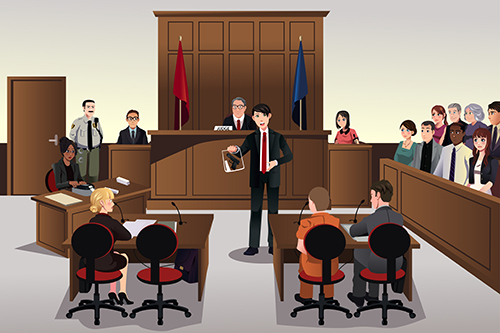I have always been fascinated with the way that courtrooms function. Countless television shows depict scenarios and demonstrate the different aspect, generally focusing on judge, attorneys, and jury. Even great literary works of art, such as Twelve Angry Men by Reginald Rose, describe the drama. In the case of the play, the focus is on the jurors and the drama that entails the determination of a person’s innocence or guilt. The importance and interest of courtroom and trials revolve around the dramatic notion of responsibility and accountability. A courtroom, therefore, has many participants who play pivotal roles and, to provide justice, such roles must be performed with utmost objectivity and responsibility.
The Main Actors
Generally, the five main characters in any courtroom are the judge, the plaintiff, the plaintiff’s attorney, the defendant, and the defendant’s attorney. As mentioned by Jeff Preszler, attorney-at-law, to hire the right lawyer for a specific set of circumstances, it is important for defendants and plaintiffs to understand the type of case. There are differences in civil and criminal cases, but mostly regarding the definition of the people involved. However, in practical terms, a civil and criminal attorney are very different.
In civil cases, the plaintiff is the party that brings the lawsuit while the defendant is the person being sued. In criminal cases, the plaintiff would be the government bringing suit against someone accused of breaking the law, and the government’s attorney would therefore be the U.S. Attorney or representative. The defendant is the person being accused of the crime, and that person hires his or her own attorney. If the defendant cannot afford an attorney, such services are provided at no cost by a Federal Public Defender.
The court tasks ordinary citizens with the job of considering all evidence presented at a trial and determine a verdict. The jury should consider all information and details presented in an unbiased manner. The size of the jury can vary depending on the type of trial. For example, in federal criminal cases, the jury is made up of 12 individuals; however, in civil trials, the number can range between 6 and 12.
Other Actors Involved
A courtroom also consists of a Deputy Clerk, a Court Reporter, a Court Interpreter, and, if the case involves criminal charges, Pretrial Officers, Probation Officers, and the United States Marshals. The responsibilities of the Deputy Clerk are to ensure that all matters are in order and that all actions of the court run according to the needs and requirements. Such duties include guiding the jury and acting as a messenger between the judge and the jury.
Court Reporters, or stenographers, are individuals tasked by the court with the exercise of documenting and recording everything that is said during a trail. These individuals can include companies that specialize in the matter and can use high tech equipment to render the services that the court requires. For example, Brickell Key Court Reporting, an agency that provides court reporters in West Palm Beach, uses high definition video conferencing equipment offer a wide range of services, including translation and interpretation often conducted by the Court Interpreter.
Lastly, for criminal cases, the United States Pretrial Services and Probation and the United States Marshals may be involved. The job of the officers from Pretrial Services and Probation is to help judges make determinations on bond considerations and other matters by interviewing and investigating defendants. The officers then provide their findings to the judge. On the other hand, the U.S. Marshals’ job, if the defendant is found guilty, is to provide the court with a pre-sentencing report that is used by the judge to determine the sentence that will be handed down.
Final Thoughts
Each of these actors plays an indispensable role in the American justice system. Although the process at times is complex and difficult to understand, it is a system that serves to provide justice in a fair and equitable manner. The verdict will be based on evaluating and treating others during the proceedings as you would like to be treated.
































No Comments
Leave a comment Cancel